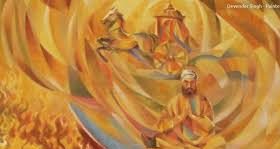Not many people know that during the exodus of Kashmiri Pandits, many Sikh families who had lived in Kashmir for centuries, also had run away along with the Pandits and lived in the camps with them.
It was the time when we used to do trauma workshops in the camps for young children.
There was a little boy not more than seven years old who always came to our group and sat with his older brother. One day, he got up in the middle of an art class and wanted to go back as he had to listen to a story from his grandfather.
“He listens to this story everyday and wouldn’t miss it for anything,” his elder brother told us apologetically.
Curious I had gone after the workshop to meet his grandfather. He was an old man in his seventies who walked upright like a soldier and greeted me warmly and asked his wife to make kahwa.
“He loves listening to this story come what may and hasn’t missed it a single day,” he added as his grandson came and sat next to him.
“What is the story about?” I asked unable to hold my curiosity.
“It is a story that I tell my grandchildren to keep their spirit alive in this camp. I heard it from my grandfather who told me he had heard it from his grandfather.”
“Can I come tomorrow and listen to it?” I asked.
“Why tomorrow? He wouldn’t mind a second time right now.”
The story that I heard will forever stay etched on me for its passion with which it was said. Hearing it I felt transported to another period, another era when a different set of values ruled and people felt threatened over keeping their faith.
As I also learnt it is a story that many a Sikh boys have heard while growing up and it belongs to the collective Sikh memory. I had just then conceived of writing a book on the trauma of Kashmir and asked his permission if I could use the gist of the story the way he told it in a chapter. He heartily agreed saying ‘isme permission kis baat di. yeh to saadi history hai. logyan nu batao to mainu bhi acha lagega. mera ashirwad twade sath hai’.
I wrote that chapter many years later sitting in the space outside Gurudwara Sisganj trying to imagine the spirit of the Guru and his disciples who gave their lives for my faith. As I was filled with gratitude, I wanted my protagonist to be affected by this story in the same way that a young boy had got up and walked away to listen to it from his grandfather.
Memory, as we know through research, is carried forward through stories that tell us a kernel of a truth that societies otherwise couldn’t record or write. Through story telling that keeps alive the identity of a people and their persecution, they impinge on our memory refusing to let us forget. Having lost their home of generations in Kashmir, the only hope of this grandfather was that his grandson shouldn’t forget his identity of who he is as a Sikh and will pass it on to the future generations.
Even though my book is a fiction, I have the belief that in a small way my writing of the story would take his vision forward

